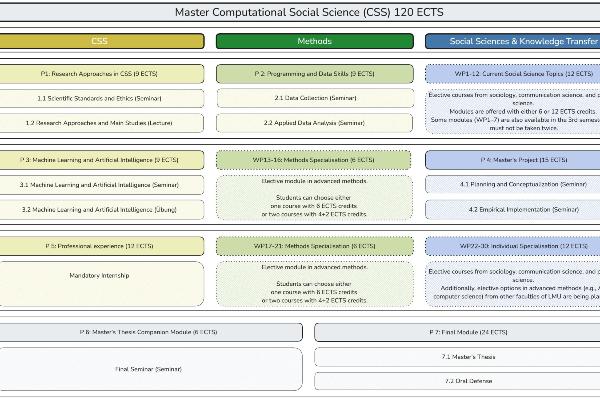The Master's program (M.A.) in Computational Social Science (CSS) combines social science with computer science and AI in a unique way. The program is composed of three pillars: a CSS pillar with central and overarching compulsory content, a methodological pillar with a great deal of freedom of choice for developing your own skills, and a social science transfer pillar with freedom for individual specialization.
Students are prepared for careers in the field of data-driven decision-making (e.g. data science, data journalism, science). To this end, they learn how to apply modern research designs and artificial intelligence methods to explore social-scientific questions: how will you use big data to better understand pressing societal problems?
The Master's program allows for a strong differentiation of personal preferences, so that CSS can be explored not only in its breadth, but also in its depth. There is therefore no obligation to include all three subjects (Communication Science, Political Science, Sociology) in one's own curriculum; however, the opportunity to immerse oneself in all three subjects is explicitly given.
A compulsory internship (9 weeks), the possibility of a semester abroad, and the Master's thesis to be completed individually at one of the three departments (GSI, IfKW, IfS) also help to strengthen individual profiles. An extensive research seminar in the second semester strengthens social skills by working together in interdisciplinary small groups.
The program's familial size allows for a close relationship between students and lecturers. The latter are drawn from all three participating departments of the Faculty of Social Sciences, namely the Geschwister-Scholl-Institute for Political Science (GSI), the Department of Media and Communication (IfKW) and the Institute for Sociology (IfS).
Examination and study regulations
During your studies, you will accumulate 120 credits according to the European Credit Transfer System (ECTS credits, one credit corresponds to 30 hours of work). You will choose from the compulsory and elective modules in accordance with the examination regulations and receive grades for all module examinations. The master's thesis is a separate module that is also graded. All information about the program, the modules, and the examination procedures can be found in the examination and study regulations:
Examination and study regulations for the Master's degree in CSS (2025, download). (PDF, 856 KB)


